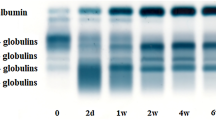Abstract
Iso-electric focusing (IEF) has become an important and powerful technique to discriminate genetic variability for several single gene systems. For example, Transferrin system was found to be monomorphic in most populations with starch gel electrophoresis, but analysis with IEF have clearly shown further microheterogeneity in this system, which makes TF a useful marker for population genetics and paternity determination. Several other serum protein systems HP, PI, GC and BF have shown similar microheterogeneity.
Access this chapter
Tax calculation will be finalised at checkout
Purchases are for personal use only
Similar content being viewed by others
References
Chakraborty R, Roychoudhry AK (1975). Paternity exclusion by genetic markers in Indian populations. Ind J Med Res 63: 162–169
Chakraborty R, Shaw MW, Schull, WJ (1974). Exclusion of paternity: The current state of the art. Am Hum Genet 26: 477–488
Constant J, Kühnl P, Viau M, Spielmann W (1980). A new procedure for the determination of tranferrin (TFC) subtypes by isoelectric focusing: existence of two additional alleles, TF4 and TF5. Hum Genet 55: 111–114
Harpending H C, Jenkins T (1973). Genetic distance among southern African populations. In: Crawford MH and Workman PL (eds), Methods and Theories of anthropological genetics. University of New Mexico Press, pp 177–199
Graber RA, Morris JW (1983). General equations for Average power of exclusion for genetic systems of n codominant allele in one parent and no parent cases of disputed parentage. In: Walker RH (ed), Inclusion probabilities in parentage testing. Am Ass Blood Banks. Arlington (Virg) pp 277–280
Papiha SS, White I, Roberts DF (1983). Some genetic implications of isoelectric focusing of human red cell phosphoglucomutase (PGM1) and serum protein group specific component (GC). Genetic diversity of the populations of Himachal Pradesh, India. Hum Genet 63: 67–72
Papiha SS, Pal B, Walker D, Mangion P, Hossain MA (1989). Alpha 1 antitrypsin (PI) phenotypes in two rheumatic diseases: a reappraisal of the association of PI subtypes in rheumatoid arthritis. Ann Rheu Dis 48: 48–52
Yuasa I, Umsetu K, Suenaga K, Robinet-Levy M (1986). Orosomucoid (ORM) typing by isolelectric focusing: evidence for two structural loci ORM1 and ORM2. Hum Genet 74: 160–161
Author information
Authors and Affiliations
Editor information
Editors and Affiliations
Rights and permissions
Copyright information
© 1992 Springer-Verlag Berlin Heidelberg
About this paper
Cite this paper
Mastana, S.S., Ray, V., Bhattacharya, S.S., Papiha, S.S. (1992). Iso-Electric Focusing Study of Serum Proteins (GC, TF, PI and ORM) in Four Endogamous Groups of Maharashtra, Western India: Application in Paternity Testing. In: Rittner, C., Schneider, P.M. (eds) Advances in Forensic Haemogenetics. Advances in Forensic Haemogenetics, vol 4. Springer, Berlin, Heidelberg. https://doi.org/10.1007/978-3-642-77324-2_110
Download citation
DOI: https://doi.org/10.1007/978-3-642-77324-2_110
Publisher Name: Springer, Berlin, Heidelberg
Print ISBN: 978-3-540-55194-2
Online ISBN: 978-3-642-77324-2
eBook Packages: Springer Book Archive




